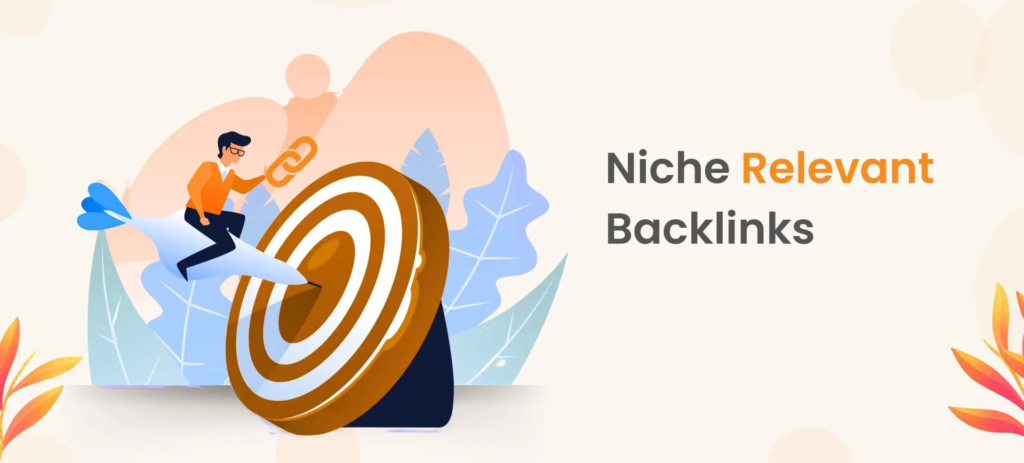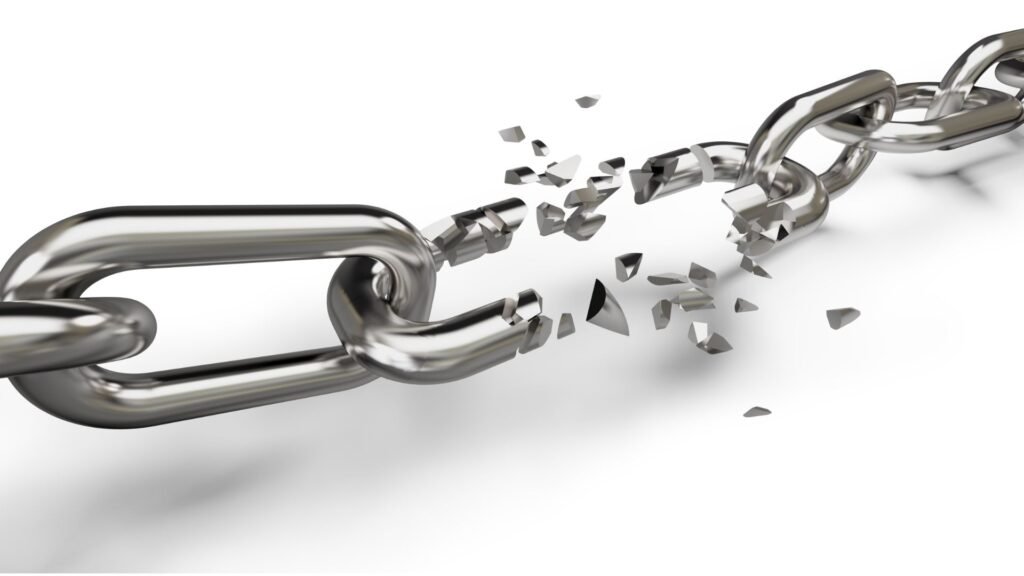
If you’ve been in the SEO game for a while, there are several other factors for ranking a website on SERPs, But in today’s blog post, we’re going to focus on niche relevant backlinks and how they can help your website rank higher on SERPs. You know that backlinks are essential. But what exactly are they? And how do you get niche relevant backlinks to help your website rank higher in search engines? Keep reading to find out.
What Are Backlinks?

Backlinks are essential in SEO (search engine optimization) because they help improve your website’s ranking on search engines. In the simplest terms, they are links from other websites that lead back to your website. When other websites link to yours, it tells Google your website is valuable and worth ranking higher. This blog post will discuss niche-related backlinks and how to get them for your website. We will also provide tips on how to improve your SEO ranking overall!
Does Do-Follow And No-Follow Links Matter?
The answer is YES!
Do-follow links are the most valuable type of backlink because they pass along “link juice.” This helps to improve your website’s ranking on search engines.
On the other hand, no-follow links do not pass along link juice. However, they can still be valuable because they help increase website traffic.
Does Relevance Matter?
Niche relevant backlinks are the most valuable because they show Google that your website applies to a particular niche or industry. This helps to improve your website’s ranking for niche-related keywords.
What Are Niche Relevant Backlinks?

Niche-related backlinks are links from websites related to your niche or industry. These backlinks help improve your website’s ranking because they show Google that your website is relevant to your niche. For example, if you have a website about gardening, you would want to get backlinks from other websites about gardening, plants, flowers, etc. You can reach out to other websites in your niche to get niche-related backlinks and ask for a link. You can also guest post on other blogs or write articles with links to your website.
Things To Keep In Mind To Improve SEO Ranking
- The quality of your backlinks is more important than the quantity. It’s better to have a few high-quality backlinks than many low-quality ones.
- The anchor text (the text that is linked to your website) should be relevant to your niche. For example, if you are a gardening website, the anchor text should be “gardening” or “garden tips.”
- The relevance of the website that is linking to you also matters. A backlink from a relevant website will carry more weight than a backlink from an irrelevant website.
Things To Be Taken Care of While Building Links
The Quality Of Content

This is the first and foremost thing that decides whether you will get niche-related backlinks. If your content is high-quality, informative, and well-researched, then only other niche websites will link to your website. So, always focus on creating great content.
Reach Out to Other Websites: Once you have great content, reach out to other websites in your niche and ask for a link. You can also guest post on other blogs or write articles with links to your website.
Anchor Text
The anchor text (the text that is linked to your website) should be relevant to your niche. For example, if you are a gardening website, the anchor text should be “gardening” or “garden tips.”
Relevance Of Linking Website
The relevance of the website that is linking to you also matters. A backlink from a relevant website will carry more weight than a backlink from an irrelevant website.
Link Building Activities: Many activities fall under link building, such as social bookmarking, profile creation, directory submission, etc. But always remember that you should do niche-related activities to get niche-related backlinks.
Domain Authority And Spam Score

The domain authority of a website measures its quality. A backlink from a high-quality website will have more value than a link from a low-quality website.
The spam score of a website is a measure of how likely it is to be penalized by Google. A backlink from a website with a high spam score will have less value than one with a low spam score.
These are some of the things that you should keep in mind while trying to build niche-related backlinks.
Proven Ways To Build Niche Relevant Backlinks
Reach Out To Niche Relevant Websites And Ask For A Link
This is probably the most direct way to get niche relevant backlinks. You can contact other websites in your niche and ask for a link. Many website owners are happy to oblige if they see your website is relevant and high-quality.
Write Guest Posts On Other Niche Relevant Blogs

Find niche relevant blogs that accept guest posts and pitch them an idea for an article. Ensure to include a link to your website in the author bio or the article. This is a tried-and-true method of getting backlinks that can still be very effective.
Example Of Guest Posting: If you own a gardening website, you could write a guest post for a flower blog. In the guest post, you could include a link to your website in the author bio or the article.
Participate In Forums
This is a great way to get niche relevant backlinks and traffic to your website. Find forums that are relevant to your niche and participate in the discussions. Be sure to include a link to your website in your signature.
Niche Infographics
Creating high-quality and complex Informational infographics has been booming these past few years, and there’s no sign of it slowing down anytime soon.
Infographics are a great way to get backlinks because they are shareable and can be posted on other websites. When submitting your infographics to directories, include a link to your website.
Example of Niche Infographic: If you have a website about gardening, you could create an infographic about tips for beginner gardeners. Then, you could submit the infographic to directories and include a link to your website.
Share Case studies

Many website owners are always looking for fresh content to post on their websites. It’s not just old content rephrased or written fresh. It’s something unique and different, maybe even controversial. By sharing your case study, you can get a backlink and traffic to your website.
Submit Content To Round-ups
A round-up is a blog post with tips, resources, or articles on a specific topic. For example, a gardening blog could round up the best gardening tips. If you have an article relevant to the round-up, you can submit it and usually get a backlink.
Using The Skyscraper Technique
The skyscraper technique is a link-building method that finds popular content and creates something even better. Once you have made the new, improved content, you can reach out to the people who have linked to the old content and ask them to link to your new article.
Example of Skyscraper Technique: If there is an article about the best gardening tips for beginners, you could create an even better article with more tips and resources. Once you have made the new article, you can reach out to the people who have linked to the old article and ask them to link to your new article.
Create Niche Directories
Directories are a great way to get backlinks and traffic to your website. You can submit your website to these directories and include a link back to your site. This can be time-consuming, but it will be worth it.
Publishing Guides
Guides are a great way to get backlinks and traffic to your website. They are similar to case studies but usually more extended and in-depth. You can share your guides on social media, forums, or other websites. When you publish your guides, include a link to your website.
Become A Source For News Reporters
Becoming a news reporter is one of the best ways to get high-quality backlinks. f you are an expert in your niche, you can be an excellent resource for reporters looking for information on that topic. When you are quoted in an article, be sure to include a link back to your website. This will help you get traffic as well as backlinks.
Broken Link Building

It’s a process where you find broken links on websites. Then, you contact the website owner to inform them about the broken link. You can also suggest a replacement for the broken link. This is a great way to get backlinks because it helps the website owner fix their site while also getting a backlink.
Unlinked Mentions
Unlinked mentions are when your website is mentioned on another website, but there is no link back to your site. This is an excellent opportunity to get a backlink. You can use a tool like Google Alerts to find unlinked mentions of your website. Once you find an unlinked mention, you can contact the website owner and ask them to add a link to your site.
Reclaim Lost Links
Links can be lost for various reasons, such as when a website changes its URL or if the link was never added in the first place. You can use a tool like Ahrefs to find links pointing to 404 pages (pages that don’t exist). Once you see these links, you can contact
Monitoring Your Competitors

You can use a tool like Monitor Backlinks to see who your competitors are getting backlinks from. Then, you can contact those websites and ask for a backlink.
Well, There are several ways to get niche-related backlinks for your website. However, creating high-quality content relevant to your niche is the most important thing. Once you have made great content, you can promote it and get backlinks from other websites.
Things To Avoid While Link Building
While link building is an essential aspect of SEO, it’s crucial to approach it ethically and avoid practices that could harm your website’s reputation or incur penalties from search engines. Here are some things to avoid while link building:

- Buying Links: Purchasing links from link farms or other websites solely to manipulate search engine rankings is against search engine guidelines. These low-quality links can harm your website’s credibility and rankings.
- Excessive Link Exchange: Engaging in excessive reciprocal link exchanges, where you agree to link to another website in exchange for a link back, can be seen as manipulative by search engines. Focus on building natural, organic links instead of engaging in large-scale link exchange schemes.
- Irrelevant Links: Acquiring links from websites irrelevant to your niche or industry can be counterproductive. Search engines prefer links from relevant and authoritative sources that are contextually related to your content.
- Low-Quality Directories: Submitting your website to low-quality or spammy directories solely to gain backlinks can negatively impact your website’s SEO. Focus on reputable and niche-specific directories that provide value to users.
- Keyword-Rich Anchor Text Overuse: Using overly optimized anchor text, especially exact-match keywords, excessively in your backlinks can appear unnatural to search engines. Aim for a diverse and natural anchor text profile that includes branded terms, variations, and contextual phrases.
- Ignoring Link Quality: Prioritize the quality of backlinks over quantity. Focus on acquiring links from authoritative, reputable websites with high domain authority and relevance to your content. Low-quality or spammy backlinks can harm your website’s reputation and rankings.
- Ignoring Link Velocity: Sudden spikes in the number of backlinks to your website can raise red flags with search engines. Aim for a natural link velocity that mimics organic growth over time rather than acquiring many links simultaneously.
- Ignoring NoFollow Links: While NoFollow links may not directly contribute to your website’s SEO rankings, they can still provide value in referral traffic and brand visibility. Don’t ignore opportunities to acquire NoFollow links from reputable sources.
- Automated Link Building: Using computerized tools or software to generate and distribute backlinks en masse violates search engine guidelines and can result in penalties. Focus on manual outreach and genuine relationship building for sustainable link-building efforts.
- Neglecting Content Quality: High-quality, relevant content is the foundation of successful link-building efforts. Not producing valuable and engaging content diminishes the likelihood of attracting natural backlinks from authoritative sources.
By avoiding these common pitfalls and focusing on ethical, white-hat link building practices, you can build a strong backlink profile that enhances your website’s visibility and credibility in search engine results.
Can Irrelevant Links Help Rank A Website?
Well, this can be a tricky question. Some people say that irrelevant links can hurt your website’s ranking. However, other people say that as long as the links are from high-quality websites, they can help your website’s ranking.
To be safe, you should focus on getting niche-related backlinks from high-quality websites. This way, you know that the links are helping your website and not hurting it.
While irrelevant links might not directly contribute to improving a website’s ranking, there are a few nuanced scenarios where they could potentially have some impact:
Indirect Traffic and Brand Awareness

Even though irrelevant links may not provide direct SEO benefits, they can still drive traffic to your website if placed on websites with significant traffic. This indirect traffic can lead to brand awareness, user engagement, and even natural backlinks from relevant sources, which can positively impact your SEO efforts in the long run.
Perceived Authority and Trust
Depending on the context, having links from various sources, even if they are somewhat irrelevant, might contribute to the perception of your website’s authority and trustworthiness. Search engines consider factors like diversity and breadth of backlink sources when assessing a website’s credibility. However, this effect is generally secondary to links from relevant, authoritative sources.
Diversification of Backlink Profile
In some cases, having a diverse backlink profile that includes a range of domains, even if some are irrelevant, can be beneficial. This diversity can help mitigate the risk of algorithmic penalties and reduce reliance on a few sources for backlinks. However, the emphasis should still be on acquiring high-quality, relevant backlinks to maximize SEO impact.
FAQs
Q1. How can I acquire niche relevant backlinks?
Ans. You can acquire niche relevant backlinks through various strategies such as guest blogging on industry-related websites, participating in forums and online communities, engaging with influencers and thought leaders, creating high-quality content that attracts natural backlinks, and networking with other businesses and organizations within your industry.
Q2. What should I consider when seeking niche relevant backlinks?
Ans. When seeking niche relevant backlinks, consider the relevance, authority, and credibility of the websites linking to you. Aim for backlinks from reputable sources within your niche with high domain authority and engagement. Additionally, ensure that the anchor text and context surrounding the backlink are relevant to your content and target keywords.
Q3. Are all niche relevant backlinks beneficial for SEO?
Ans. While niche relevant backlinks can benefit SEO, not all backlinks are created equal. Focus on acquiring high-quality, authoritative backlinks from reputable sources within your niche. Avoid low-quality, spammy backlinks that can harm your website’s reputation and rankings.
Conclusion
In conclusion, backlinks are essential to SEO and can help improve your website’s ranking in search engines. There are several ways to get backlinks, but the most important thing is creating high-quality content relevant to your niche. Once you have created great content, you can promote it and get backlinks from other websites.
If you want to learn more about SEO and link building, I suggest checking out our other blogs. If you have any questions, feel free to leave a comment below. Thanks for reading!


